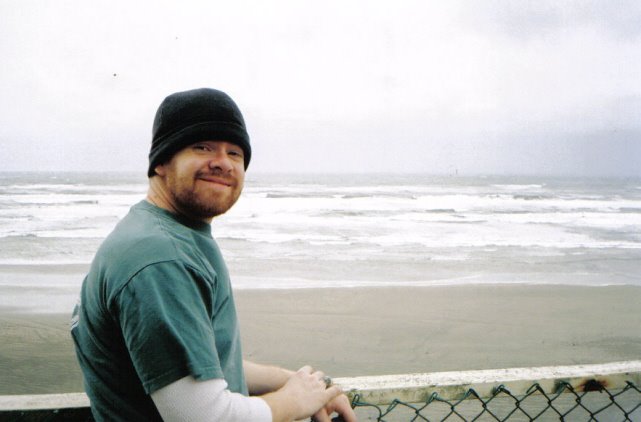Omega Woman.
 While my wife attended a mandatory education day at the hospital (something that medical professionals loathe as obligatory), I took the time to watch a matinee. Not having known more than the premise of Children of Men, where, in the near future, humanity has been paralyzed with global infertility and by this has degenerated to cataclysmic strife, I decided to go in quasi-blind. Now I've considered myself a fan of dystopian philosophy for many years, having read my fair share of Aldous Huxley, George Orwell and Alan Moore to name a few. Because of this I initially found the film’s setting of London was a fine choice.
While my wife attended a mandatory education day at the hospital (something that medical professionals loathe as obligatory), I took the time to watch a matinee. Not having known more than the premise of Children of Men, where, in the near future, humanity has been paralyzed with global infertility and by this has degenerated to cataclysmic strife, I decided to go in quasi-blind. Now I've considered myself a fan of dystopian philosophy for many years, having read my fair share of Aldous Huxley, George Orwell and Alan Moore to name a few. Because of this I initially found the film’s setting of London was a fine choice. This location removed questions as to how the authoritarian government came to be in charge by ordering the ruthless deportation of all non-British persons and wasn’t seeking democratic voices from the people, nor tolerating lengthy debates as to a course of action. This was a Thatcher-based, “down-with-terrorism” dictatorship. People are publicly caged en masse awaiting transportation to concentration-style camps for shipping to points-of-origin. All are separated from the general public by lines of SWAT police with automatic rifles, guard dogs and a foreboding sense of veracity. Then there is the general public who simply “don’t care.”
Scenes in which the hero, a Government drone named Theo seamlessly played by Clive Owen, reflects this despair, the same all Britons carry. Even after surviving the bombing of a café from which he’d only just bought a cup of coffee, his indifference toward the decay of society shows in his unshaven face, rumpled shirt and the resignation stamped upon his face.
This has never been a thought I’d considered. Taking for granted the ability of humanity to procreate. After working on Labor & Delivery for the past four years, I’ve come to regard birth as the most stable job in the medical profession. Then specific scenes in the film hit me with the gravity of what I’ve overlooked. The image of an elementary school, dilapidated and strewn with graffiti, made me shutter to think of all the teachers no longer instilling new ideas to the next generation because there was no generation to follow. The tale related by a midwife character’s as she realizes the coming crisis after several of her and her colleagues’ expectant mothers miscarry more often and at earlier stages of their pregnancies. This made me pause, reconsidering the one job in medicine that seemed most stable as suddenly pointless. Then the one aspect of the film that made me cringe: there were no sounds of children playing or babies crying. Even the imagery lacked a child’s imagination and was replaced with drab and perfunctory style as only adults can muster.
This movie bombarded me with themes lambasting the acceptance of routines, hopelessness, narcissism and apathy. The film's director, Alfonso Cuarón who directed the sinister-styled Harry Potter and the Prisoner of Azkaban, seemed to be enjoying the chaos of the genre and in the setting he created on screen. Amongst the droves of terrorists, police and vigilantes with guns and bombs, Owens' hero escapes blind madness without carrying a weapon aside from his newfound hope in seeing the expectant mother of Earth's first child in eighteen years to safety outside of the UK. Cuarón's directing allows him to take subtle, enjoyable liberties with inserts of other dystopian themes (train monitors & billboards with 1984-like authoritarian messages to the masses, an inflated pig-balloon over the Battersea Power Station on the River Themes via Pink Floyd's: The Wall and another Orwellian theme from Animal Farm). With the battering of so many messages, the culmination of these comes during the birth scene. Like the rest of the film, this is Christ story of the Old Testament told in the antithesis that the rest of the film carries. By lantern, the whiskey-soaked and tremulous hands of Owen's character coaches the scared-shitless mother through her contractions on a stained mattress in a dilapidated hotel among the UK zone of refugees bound for deportation. The entire scene is fitting to both the beginning and end of humanity.
Even when the realization that a newborn has come, the miraculous moment of peace that crops up amongst two militaristic fronts is ruined with explosive consequence and the realization that even when hope arrives someone will fight to claim it as their property. There is little hope for mankind as this film ends. Despite the proof that procreation is still possible, I was left to believe that where biology can succeed, society will continue to overlook the obvious causes of misunderstanding.







<< Home